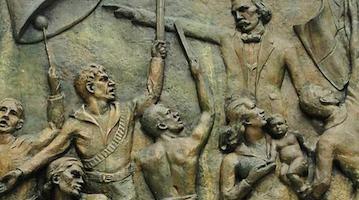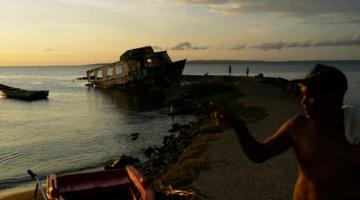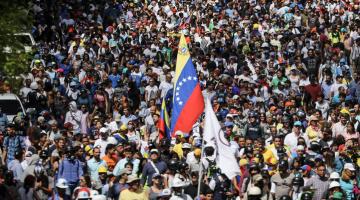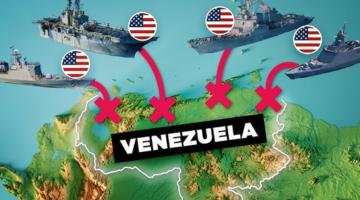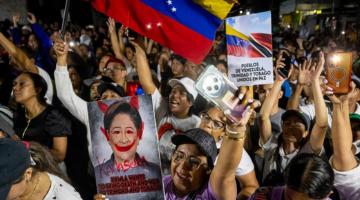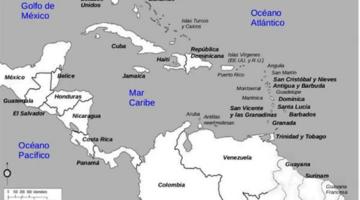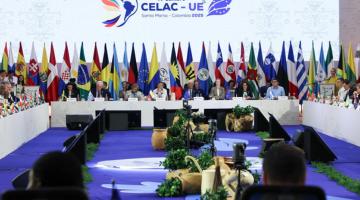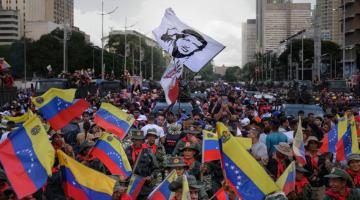International Women's Day has radical roots going back more than 100 years. Caribbean women have always played a pivotal role in political organizing.
March 8, 2022 marked the worldwide celebration of International Women’s Day. While the day has become a catch-all event - covering everything from women’s entrepreneurial empowerment to the celebration of western women’s imperial adventures - it’s radical history should not be forgotten. The origins of International Women’s Day are in the 1909 declaration of the Socialist Party of America to observe a “National Women’s Day.” The following year, in August 1910, the delegates to the second International Socialist Women’s Conference was organized in Copenhagen, Denmark, a few days before the Socialist Second International Conference proposed the celebration of a “Women’s Day” to fight for equal rights and women’s suffrage. The Socialist Party of America continued to mark “National Women’s Day” in the U.S., as did European women in Austria, Denmark, Germany, and Switzerland. Women in Russia began celebrating the day in 1913, and in Germany in 1914.
International Women’s Day truly took off when a February 1917 demonstration of Russian women, led by feminist Alexandra Kollontai, led to events that precipitated the fall of the empire of Russian Csar Nicholas II and, ultimately, to the Russian Revolution. In 1917, Vladimir Lenin, the founder of Russia’s Communist Party made “International Working Women’s Day” a national holiday and it came to be celebrated by socialist countries including China. Proclaiming 1975 as the “International Women’s Year,” the United Nations moved to adopt “International Women’s Day,” beginning in 1977. They removed “working” from the day’s title.
International Women’s Day originated during a period when African-descended women across the world were under colonial domination and fascist rule. Indeed, in the mainstream histories of International Women’s day, Black women, who made up the bulk of the unpaid and paid racialized labor force in colonial and neocolonial societies, continue to get short shrift. Yet as Trinidadian educator and activist Rhoda Reddock argues in “Women's Organizations in the Caribbean Community from the 19th Century to Today,” reprinted below, the history of Black women is not only one of exploitation, but of organization and resistance.
Women's Organizations in the Caribbean Community from the 19th Century to Today
by Rhoda Reddock
Women in the English-speaking Caribbean have been members of women's organizations since the 19th century. In the main, these have been religious-based women's organizations, especially of the various denominations of the Christian Church. In this region the organization of women was particularly important as in the late 19th and early 20th century it was the main mechanism for transferring and inculcating Western European values of women's place, the sexual division of labor and social and domestic organization.
The large-scale organization of women continues to take place within religious bodies. On the one hand religion represents a legitimate space within which women can freely participate outside of the home, without question or need for justification. On the other it provides that spiritual solace and community in a world in which hard work, social and economic and physical or emotional violence are the order of the day.
The large-scale mobilization and organization of women has also occurred within the labor movement and political organizations. The early labor movement (from which many of our political parties emerged) was a much more amorphous grouping than present-day trade unions. In particular the very broad concept of "worker" which was used facilitated the participation of persons involved in a wide range of economic activities.
Today, women continue to be members of unions, especially in those occupations dominated by women.
Nevertheless, even in these unions, few attain or accept leadership positions. Today, the trade union movement, in spite of a significant female membership, continues to be a male dominated institution not only in its leadership but in its concerns and style of operations.
The re-emergence of the women's movement internationally in the late 1960s and early 1970s ushered in a new era in the Caribbean women's struggle. Unlike the earlier movement, this impact has been broader and has touched many more aspects of personal and political life than its forerunner earlier in the century
Interestingly enough, many of the first women to be influenced were the stalwarts of the traditional women's organizations from the era of the 1950s, many of whom were heavily involved in nationalist political parties which emerged at that time. It could be said that the new consciousness seeping into the region reminded these older women activists of the marginal position they still had within their political organizations and societies as a whole.
In the late 1960s and early 1970s also, small groups of women began to meet and discuss their situation, many influenced by the ideas emanating from the radical black power, anti-war, new left and women's liberation movements of North America and Europe. The contradictions among the various strands of this new left politics were felt most by the women of these movements. One writer recalls the launching of the women's section of the national Joint Action Committee in 1971 (at the suggestion of the brother). This encouragement, she noted, had the "cautioning clause that this auxiliary, supportive arm was to have nothing to do with what they labeled "white women's liberation'' in North America and Europe"...
Many of those small groups, like the Jamaica Association for the Repeal of Abortion Laws (JARA) in Jamaica and the Committee for the Defense of the Rights of Women in Trinidad, or even Women Against Terror in Guyana, comprised middle-strata women, many members or associates of small left-wing political parties, but not many. It is interesting that at both levels the Caribbean women's movement has been activated and propelled by women schooled in the male-dominated political culture.
In spite of the strong radical bent in Trinidad and Tobago, one of the earliest of the new women's groups to be formed was the Housewives Association of Trinidad and Tobago. Launched in 1975, its objectives included "the task of encouraging the exchange of information and ideas for the promotion of joint action among women in the national interest ... In its short active life, this group was able to mobilize a national membership (including Tobago). And although it concentrated on consumer issues its main contribution was a published survey on the conditions of work of domestic servants.
In 1977 the Sistren Women's Theatre Collective, one of the first of a line of feminist-oriented autonomous women's groups was formed. Unlike many others, it had a predominantly working-class membership, and used drama as a workshop and performance tool for consciousness-raising and entertainment.
By the 1980s, small radical or feminist-oriented women's groups mushroomed throughout the region, beginning with BOW AND in Belize in 1979, an outcome of a WAND Workshop, and followed by the Concerned Women for Progress in Trinidad and Tobago which by 1985 had spawned The Group (1983) and Workingwomen (1985).
Other organizations included the Committee for the Development of Women in St. Vincent and the Grenadines (1984), the Belize Rural Women's Association (1985), Sisi Ni Dada of St. Kitts/Nevis (1985), Red Thread of Guyana (1986) and most recently the Women's Forum of Barbados (1988). The activities of these organizations, many of which have quite a small membership, have been concentrated on consciousness-raising internally and among the wider public through activities in popular education, income-generating projects, skills training (in both traditional and nontraditional areas), media watch and development or alternative media radio programmes, videos, newsletters, films, exhibitions, and slide-tape shows.
Although small and voluntary in membership, the impact of these groups has usually far surpassed their size. This influence has usually been achieved through campaigns on relevant issues which have been able to draw in a wide cross-section of women including women from the more established and traditional women's organizations. Among the more successful of these were the campaign against violence to women in St. Vincent and the Grenadines in 1985-86 and the campaign over the Sexual Offences Bill in Trinidad and Tobago during the same period. The issue of sexual violence has been a key factor in mobilizing women throughout the region. This issue which includes domestic violence - sexual abuse of children, rape in unions, wife battering, rape, incest, sexual harassment in the workplace and other forms of sexual assault has served to be the one issue capable of uniting women of all classes, races and ethnic groups. In the Caribbean region, it has been the one factor which has brought to women some understanding of body politics and its relationship to the wider socio-political and economic system. As noted by Patricia Mohammed, the impact of this new consciousness was felt in the media where the lyrics of calypsoes, one of the popular indigenous musical genres of the region began to reflect women's resistance to, and men's rejection of male violence towards women.
These developments have served to radicalize the established women's organizations and force them to refocus away from charitable works to their original concerns, the emancipation of women. Changes can be discerned (for example) in the activities of the YWCA which at least at a regional level began to concern itself much more with is sues of women' s health, young women and world peace, and among women in church groups (mainly of the established Christian churches) where, for example, the Barbados Mothers Union (Anglican) has taken up the issue of sexual violence and the ordination of women priests. In Barbados and in Trinidad and Tobago, the Business and Professional Women's Clubs have both established institutions to assist battered women while the Soroptimists have concentrated their efforts on women and work.
Among the non-Christian religions, the influence has also been felt. In Jamaica, women within Rastafari have begun to assert their identity and while one representative of the organization, Mada Wadada (Mother Love) found it impossible to conceive of a women's group of women and for women, she noted that - **More and more internationally the sisters adopt new strategies to achieve economic independence and consequently independence of their children" (Mada Wadada, 1988).
Similarly in Trinidad and Tobago the Hindu Women's Organization formed in 1987 seeks to mobilize the Hindu woman, and "deal specifically with matters affecting the Hindu woman and her relationship with the wider society "(Gopeesingh, 1988).
Suffice it to say there has been some influence on the labor movement but much less than in other areas. Women's committees have been established in some unions to replace women's auxiliaries but in spite of an ILO/DANIDA regional programme for women trade unionists, real change has been minimal. Individual women and groups of trade union women have been active in the movement, but they have not really been able to check the male-dominated core of the labor movement.
In 1985, the Caribbean Association for Feminist Research and Action (CAFRA) was formed. It filled a long felt need for a progressive feminist oriented network of Caribbean feminists and feminist organizations. The significance of CAPRA lay in its decision to challenge head-on the prejudice and negative assumptions traditionally associated with the concept of feminism. In so doing, it sought to define a Caribbean feminism which links women's subordination with other systems of subordination - race, class and nation, and to go beyond traditional boundaries of language and culture. CAIRA membership now includes the Dutch-, English-, French-, Spanish-, and American-speaking Caribbean as well as women in the Caribbean diaspora.
Programme activities include support to women's groups/organizations in the region in research/action on women in agriculture, women's history and creative writing; communication/information and collaboration across linguistic barriers, and the establishment of a documentation base for use by individuals and organizations.
Around 1987 another regional network. Women for Caribbean Liberation (WCL) was launched in St. Vincent. Headquartered in Antigua, this group initially emerged as a network of women associated with socialist-oriented political organizations who had met in Antigua for the First Caribbean Women's Encounter. So far their activities have focused on women's work and the popularization of information on developments in Haiti
From the above one can get the impression of a well-developed and effective women's movement within this region. Developments however are uneven, both within countries and within the region. Daily, women activists are coming to terms with the fact that achievements so far have only scratched the surface and the lives of the majority of women are yet to be touched. The impact of the present world economic crisis does not make our task any easier.
Rhoda Reddock, “Women's Organizations in the Caribbean Community from the 19th Century to Today.” Excerpted from: WOMANSPEAK!: A magazine about Caribbean Women, Nos. 26 and 27. December 1990. Published by Women and Development Unit (WAND), School of Continuing Studies, Finelands, St Michael, Barbados.

